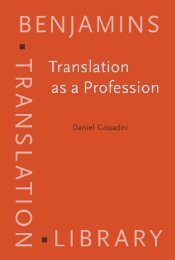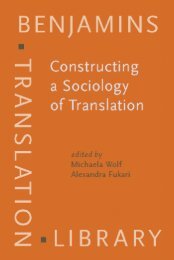Hermeneutics and Translation Theory.pdf
Hermeneutics and Translation Theory.pdf
Hermeneutics and Translation Theory.pdf
Create successful ePaper yourself
Turn your PDF publications into a flip-book with our unique Google optimized e-Paper software.
Iranian Translators Cyber Association Articlesmany that translation is itself an end, serving a certain purpose. When it comes to a differentpoint of view-translation is also a medium, or a process, I have something different to say.Simply put, translation involves decoding of the original discourse <strong>and</strong> encoding of the targetdiscourse, both done by the translator or interpreter. During this process, absolute faithfulness oraccuracy is but an illusion, or best, an impossible idealistic pursuit. To achieve the maximumeffect or impact of the original discourse <strong>and</strong> to avoid failure of communication,accommodations are made for a variety of reasons. (See my paper Accommodations in<strong>Translation</strong> for reference, at www.accurapid.com)In a word, translation in my opinion is both a process <strong>and</strong> a product. Research therefore ought toinclude all factors <strong>and</strong> elements concerned about them both.The Three Factors All ConsideredIn the following discussion I will concentrate on the development of translation theory on thehermeneutic basis.The AuthorCentering on the author, there has been a lot of followers who preach that in literary translation athorough study of the author's life experience, historical <strong>and</strong> social background is of paramountnecessity for any translator to ensure interpretation of the author's meaning or intention is mostadequate. There have been many articles <strong>and</strong> theses on evaluation of a literary work, diggingquite in depth those factors about the author to make sure the interpretation of the work is theclosest. For example, in translating Shakespeare into Chinese many would draw heavily fromhistory. "The 16th century in Engl<strong>and</strong> was a period of the breaking up of feudal relations <strong>and</strong> theestablishing of the foundations of capitalism."(Wu, 1996: p71) "Together with the developmentof bourgeois relationships <strong>and</strong> formation of the English national state this period is marked by aflourishing of national culture known as the Renaissance" which originally indicated "a revivalof classical arts <strong>and</strong> sciences after the dark ages of medieval obscurantism." Shakespeare as ahumanist held his chief interest not in ecclesiastical knowledge, but in man, his environment <strong>and</strong>4
















